- Home
- Anne Rivers Siddons
Colony Page 3
Colony Read online
Page 3
“Prob’ly not,” Aurelia said. “But he remember when he see that car. Where you git that thing, Kemble? You ain’t bought it, is you?”
“Peter rented it from Rhett Gittings when we got here. What’s the matter, don’t you think it’s grand enough for the Saint Cecilia?”
“Lawd God, Kemble, Rhett Gittings—” Aurelia began.
“Oh, he doesn’t use it for funerals.” Kemble grinned. “It belongs to his uncle from Savannah, who hardly ever uses it. Don’t worry, ol’ Buckeye won’t go to the ball reeking of formaldehyde.”
I began to giggle and then to laugh. I couldn’t help it. First that outrageous, unseemly, magnificent acre of white lilacs, and then the undertaker’s uncle’s car.
“I thought, since we obviously couldn’t get a horse and carriage out here, this was the nearest thing to a closed carriage that we’d find,” Peter said.
I stopped laughing and looked at him. His long, tanned face was anxious. Kemble had undoubtedly been telling him some of the rituals and traditions of the Saint Cecilia, and he had remembered that one of the most cherished was to go to your first ball in a closed carriage, with a proper roof and doors that shut solidly. That substantial thunk, up and down the old streets south of Broad on Saint Cecilia night, was as right and proper a sound as the chink of softly burnished old silver, the ting of cloudy old crystal.
It was a tender, cherishing small gesture to bring me a carriage, one a mother might make, or a father…but my mother never could and my father never would have.
I smiled at Peter Williams Chambliss, standing there in the dim fustiness of my foyer on Wappoo Creek. This man was not, after all, a stranger. This man had come bringing with him lilacs from his family’s heritage and a closed carriage from mine. Whatever he had come for, it was not to harm me. A wash of giddy joy swept me like a rip tide. Tonight…oh, tonight! Tonight would be all right, after all. Tonight I would know just what to do….
“Aurelia, would you put these in water for me, please?” I said grandly, as if I had bidden her to do just that every day of my life. “I’m going to go up and…do some things. Peter, you and Kem make yourselves at home in the drawing room. Dinner will be about six-thirty.”
“Dinner be whenever I gits it on the table,” Aurelia said under her breath, but she took the flowers and went out with them, burying her face in their petals.
“Ummmm, ummm,” I heard her murmur.
“Are there any spirits in the drawing room, Modom?” Kemble called after me. “Or shall I ask Jeeves to fetch some from the cellar?”
“There’s enough left of that stuff you bought from Shem Waller over on John’s Island to lay you up for three days, Kemble Gascoigne, just like it did last time,” I yelled down at him from the stairs. Somehow I did not care what I said around Peter Chambliss. The afternoon was as bright and strange as if I had been drinking champagne. The last thing I heard as I slammed my bedroom door shut was Peter’s laughter.
Oh, that night. It was, for me, the first of those moments that divide time, so that you think in terms of before and after. Was it before the war or after? Did it happen before the Saint Cecilia Ball or after? It was late that night, home once more and lying in my familiar white tester bed, staring up into the starched muslin canopy where I had stared for all the nights of my seventeen Novembers, that I first thought of time and life as anything but a smooth continuum. I had, I realized, thought about it, if I thought at all, as a kind of seamless brush-stroke arc, all the same color and value and thickness, stretching languidly from my birth to the faraway, unseen, unimaginable point of my death.
But now I saw clearly that life and time were like the readings of a seismograph; that life flowed—or careened, or plummeted, or soared, or perhaps merely slogged—forward from a series of spasms, or shocks, as clearly traceable as the activity of a series of quakes. And that it was entirely possible, many years later, to look back and see just where each quake had occurred and what sort of tracery it left…or what sort of damage. It was a frightening concept, and I shook with it as much as anything else that night as the moonlight on Wappoo Creek grew old: that I was and forever would be vulnerable to the random spasms of my life, great or small, and that tonight the first of the great ones had struck me. What pattern, what tracery, it left upon the graph was not up to me, and in any case it hardly mattered.
Just before I went downstairs that night I looked at myself in the cloudy old pier glass that had been my mother’s, which stood in the corner of my bedroom. The fashion that year was for formal gowns cut to the knee in front but trailing out behind in a small train; they had dropped waists and were often so heavily beaded it was not possible to sit in them. Fortunately for me, girls at their first Saint Cecilia Ball wore floor length drifts of pure white cut in the chaste, full style of debutante balls everywhere and in all times; I would have looked, as Kemble said when he sent me the dress, like a chambermaid in a bad French farce in one of the current gowns.
But this dress was pure legerdemain. In it I looked…not real. Not me. Not round and low to the ground but tall and willowy and anchored to earth only by the white slippers that had come with the dress. This dress had thousands cf tiny crystal pleats from neckline to billowing hem, cinched at the waist by a satin sash that spilled little crystal beads down the front, and a shallow boat neckline that flared into puffed, pleated sleeves but left my shoulders bare. The label in the dress and on its box said Fortuny; it did not shame me in the least that it was Aurelia, not I, who had caught her breath in recognition of that name when the package came. After all, she had had far more to do with ballrooms than I.
“Well, he know what it take to turn a mule into a race hoss,” she had said that day, and I had scoffed and for a long time refused to try the dress on. But then one night after dinner I had, and saw what she had seen when she had first held up its spindrift stuff.
How had he known?
In the old mirror, its wavy greenish surface like looking into a forest pool, I leaned to meet this spectral woman who stood…or floated…in my childhood bedroom. Aurelia had come in while I was brushing my thick black hair, said, “No, not tonight,” taken the brush from me, and silently piled my hair into a high coil that gave back light like lacquer. Then she had brought from her apron pocket a little velvet sack and taken from it a string of single pearls like sea water at dawn, perfect and luminous, and fastened them around my neck. Together and in silence we had looked at my image in the mirror, and then she said, “Your mama wore these at her first Saint Cecilia. Your granddaddy give ’em to her. She wore ’em at her wedding, too. She give ’em to me to keep for you not long before you was born; she say she ’fraid she gon’ forgit, what with one thing and another, and she know as sure as she born yo’ daddy would. I kep’ ’em in with the string of beads yo’ grandmama give me when Duke and me got married and come out here to yo’ mama. Mine’s jet; they looked real pretty together, them and these pearls. But not half as pretty as they look on yo’ neck. You act as pretty as you look tonight, Maude, an’ yo’ mama and daddy be real proud of you.”
“What about you?” I had said.
“I always proud of you,” Aurelia said. “You know that.”
I had hugged her, and she hugged me back and went out of the room. At the door she looked back.
“That Peter a nice boy,” she said. “You behave yourself with him. You don’t want him gittin’ no wrong ideas about you.”
I stared at her, affronted. “What ideas? I don’t even know how to…give anybody wrong ideas.”
She looked at me for a space of time and then pointed at the mirror.
“That girl know,” she said, and went out the door and closed it.
I leaned now, in the low yellow lamplight, to the very surface of the mirror, so that the hair at my forehead touched that other hair, and my nose bumped that nose. Our breaths met and mingled, frosting the glass.
“Do you know?” I whispered. “Do you?”
“Let’s go, Mau
de,” Kemble shouted from downstairs.
And I touched the girl’s cheek and said, “Yes, you do,” and turned swiftly so that my dress billowed out behind me, and ran, lightly and in joy and terror, down the stairs of Belleau to meet Peter Chambliss.
“So it was perfect, huh?” my granddaughter Darcy said on that evening in Retreat, across a bridge of years and pain from me.
“Yes,” I said, smiling into the birch fire that whispered on the old black stone hearth. “Yes, I think it was. Like a movie. Or, no…like a very good romantic play. One of Noël Coward’s, maybe. With just that bittersweet edge to it, for salt. A perfect night.”
“Nothing is perfect, Grammaude,” Darcy said with the creamy assurance of youth. She stretched her pretty cat’s body out to the dying warmth of the fire, slowly, so that all the muscles played and snapped back in sequence. It seemed newly ripe and fluid with love, that young body; I remembered that. The oiled sweetness echoed in my own limbs.
“Very few things, I’ll admit, but that was,” I said. It nettled me slightly to have that night so summarily dismissed by one too young to have had many such herself.
“Oh, nuts. I never figured you for a softie. You know as well as I do, there’re thorns on the roses. Blood and entrails in the pretty white snow. Tiny screams under the birdsong, and all that. ‘Life is real, life is earnest.’ ”
Darcy was herself a child of woods and water and the wild, as I had been; she was right, and I knew it. Still…
“You sound just like your great-grandmother Hannah,” I said. “I’ll bet she said the very same thing to me a thousand times in the first few summers we spent up here. ‘Life is real, Maude; it is not a silly child’s fancy. Life is real.’ I was a great trial to her.”
“Hah,” Darcy said. “She should talk. From what I hear of that old martinet and her crowd, life up here was about as real as tea with Helen Hunt Jackson. Morning calls with cards, and nature walks, and drives with rugs and parasols, and luncheons with linen and china, and servants and bridge and dessert parties and musicales: all of Retreat was a stage set for a play about country life. Still is. Look at it. Look at us. You’re sitting in her chair and I’m sitting in one Great-grandpa brought up from Boston, and so far as I know neither one has ever been moved an inch. Or a pillow changed. Or a new picture hung. You could set the cast of some old Mary Roberts Rinehart play down in this place and they’d be able to pick up in mid-line. Real and earnest indeed.”
I laughed. She was right about that too. Retreat is and always has seemed as timeless and lost to the world as a page from a Victorian novel. But under it, under all the careful rusticality, rocks lie, as cruel and tearing as the ledges on the outer islands in the little picture-book harbor, as the ice of winter in the black ponds. Well, Darcy herself surely knew that, and one day would know it even better.
“Maybe most things only seem perfect,” I said. “But that night really was….”
* * *
And it was. As far as human life can be, in one small arena of time and space, perceived through one pair of very young and human eyes, that night in November of 1923 at the Saint Cecilia Ball was perfect. It might not have been, undoubtedly was not, to anyone else there; I don’t even think Peter found it perfect, though he came later to speak of it with me as though it were.
“Our one perfect moment”; we laughed about it many times later, when things went awry: when Petie cried through the fourth straight night with colic; when the hours dragged on and on and Happy did not come home or when Tommy O’Ryan came home yet another night stumbling drunk; when small Sean’s screams of rage and terror left the colony heavy-eyed and thin-lipped.
“Well, we had our one perfect moment, anyway.”
But no, I don’t suppose Peter really thought it was. By then Peter knew about the dark places that lie even at the heart of light, even if he had not yet visited them. Even in the light places, even in the heart of love, the dark waited for Peter.
That night, however, Charleston brought out every trick and wile and enchantment in her arsenal for us, so that even my father, sitting bemused in his own father’s greenish swallowtail in the front seat of the Packard with Kemble, turned to Peter and me in the back seat as we rounded the point of the Battery on East Bay Street and said, “Have they cleaned up downtown or something? It looks different.”
“It looks just like it has for three hundred years, more or less.” Kemble grinned at him. “When was the last time you were downtown at night, Papa?”
“I don’t remember,” my father said vaguely. “I don’t get in to town much. I suppose it was the last time I went to a Saint Cecilia.”
“And that was?” I teased him.
“Well, I don’t think your mother and I were married yet,” he said seriously. “I remember I had on this same coat, though.”
We all laughed with giddiness and affection and joy at the sheer, flagrant, throat-tightening seduction of Charleston on a Saint Cecilia evening. Overhead the high white hunter’s moon sailed above the great moss-shawled oak trees in Battery Park, and across the black harbor a string of lights picked out Fort Sumter and the tip of Sullivan’s Island. Palms rattled in the warm wind off the sea, and gas lamps glowed yellow on the brick streets and on the lacy swirls of the wrought-iron gates and fences and balconies of the high old town houses. By day they were the ripe-fruit colors of the semitropics: yellow, pink, coral, green, cream, white, aquamarine. But in the moonlight of November they were all silver and pewter and gilt, and the night around them black velvet, and the stars above them diamonds of the very best quality. Down here, south of Broad, in the warren of old brick streets and alleys, where the oldest names of the city dwelt, there were few cars in sight and virtually none abroad on the streets, but there were fleets of shining-black horse-drawn carriages and, in them, glimpses of cloudy white dresses and flowers and correct black evening dress, and young faces blanched with expectation. Candles blazed in many windows, and from one, which I knew was the fabled Manigault House with its Sword Gates, a little liquid curl of Palestrina spilled like a handful of jewels flung out into the night.
“God, it’s the most beautiful city in the world!” Peter breathed.
I turned to see if he was being sarcastic. He moved, after all, in the exotic streets of Boston and the East and, Kemble had said, Europe and South America. He wasn’t. The smile he turned to me was that of a child at a wonderful party.
“It’s completely out of any world I know. It’s like a night in some fabulous Creole place a world away, centuries ago, or like a fairy tale…. Where are the cars? Where are the people going to the movies or to…to buy toothpicks and Sen-Sen?”
“They say that on the night of the Saint Cecilia, everybody who isn’t invited puts the car in the garage and turns off all the lights and sits in the dark till dawn, so nobody will know they’re home,” Kemble said. “You’re chopping tall cotton tonight, old man. I hope you’re properly impressed.”
“I am,” Peter said. “By the dance and the town and the night and…everything.”
In the darkness of the back seat my face burned, and my hands, when I clasped them together, were as cold as a dead woman’s.
In the foyer of the old hall, standing at the edge of the red carpet with my arm through my father’s and my heart bidding fair to buck out of my chest, I stopped for a moment, looking inside. In my terror and exaltation the great, graceful old room seemed a teeming swarm of candles and roses and gilt and faces turning toward us, faces over severe black evening clothes and dark silks and drifting cumuli of white, faces I did not recognize, though I almost certainly knew most by name. Music swelled and eddied and ebbed; voices and laughter murmured and rose. Was it at me? Surely it was. Surely it had always been…. My wrists and lips began to buzz horridly, and I thought I would surely vomit or faint. I tensed my muscles to turn and flee, and felt a hand on my shoulder, and heard Peter’s voice in my ear.
“There isn’t a woman in that room who can hold a candle to
you tonight,” he whispered. “Every one of them looks as if she’d like to stab you through the heart and grab that dress and go in the Ladies’ and put it on and leave hers in the trash can. Drawers too, probably.”
I took a deep breath that came out in a hiccup, and my heart jolted forward and into a deep, smooth groove, and laughter bubbled up from under my ribs, and I said over my shoulder to him, “Thank you,” and to my father, “Let’s go, Pa,” and we swept into the ballroom and into the night.
From the beginning it was a triumph and I was a belle. I can say that now because it had never happened to me before and it never did again, and because I know full well it was Peter Chambliss who lit the fire that burned in me that night, who made the assembled friends and acquaintances and know-by-names and know-by-sights and cousins and aunts and uncles and grandparents and even old family servants believe that Caroline and Gus Gascoigne’s strange brown gnome of a daughter had, against all odds, turned into a beauty. Because I was far from beauty, then or ever. Too darkly earthbound, too clearly a small creature of swamp and creek and old green darkness. But that night I shone like a tall taper, shimmered, burned. All because he stood beside me, and held me on the dance floor, and bent his head down to mine to laugh and whisper at supper.
It is a thing I saw people notice about Peter from the day I met him to the day he died: that impact on the eye, that almost physical clap of presence, as if some invisible concussion had left the very air shivering. He drew the eye like wildfire, or a wild animal. It was hard to look away from him. And yet, if you attempted to analyze it, you would come up with nothing that added up to that silent thunderclap. Peter was very nearly a plain man.
He was always too thin, and very nearly stooped with his height, and his features were long and sharp, a veritable caricature of wellborn New England. His chin jutted and his sandy eyebrows overgrew his deep-set gray eyes and his thick white-blond hair was usually down across his forehead, and his mother Hannah’s vulpine white teeth were startling in the deep-water sailing tan he kept most of the year. But he moved with a sinuous, lazy cat’s grace even when he shambled along at his slowest, and he was a wonderful and boneless dancer and an effortlessly good tennis player, and his smile was the very definition of the word sweetness. And there was that other thing about him, that caught and held eyes: a kind of goodness. A deep, bright aura of safety. Caring seemed to flow from him like wild honey. His father had it too, if more dimly. Poor Big Peter, poor Little Peter. No one could have lived up to that.

 Colony
Colony Nora, Nora
Nora, Nora House Next Door
House Next Door Homeplace
Homeplace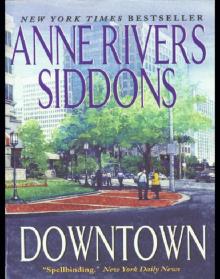 Downtown
Downtown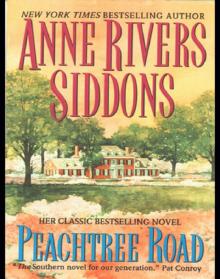 Peachtree Road
Peachtree Road Sweetwater Creek
Sweetwater Creek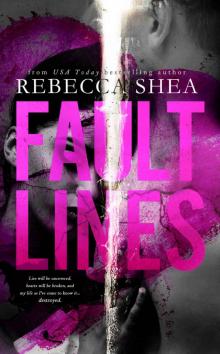 Fault Lines
Fault Lines Low Country
Low Country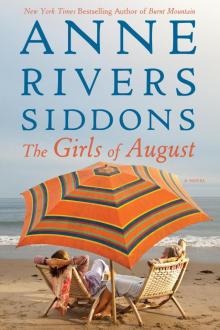 The Girls of August
The Girls of August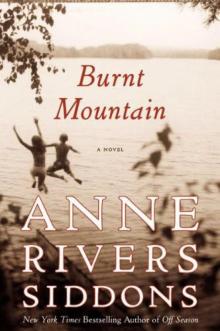 Burnt Mountain
Burnt Mountain Islands
Islands